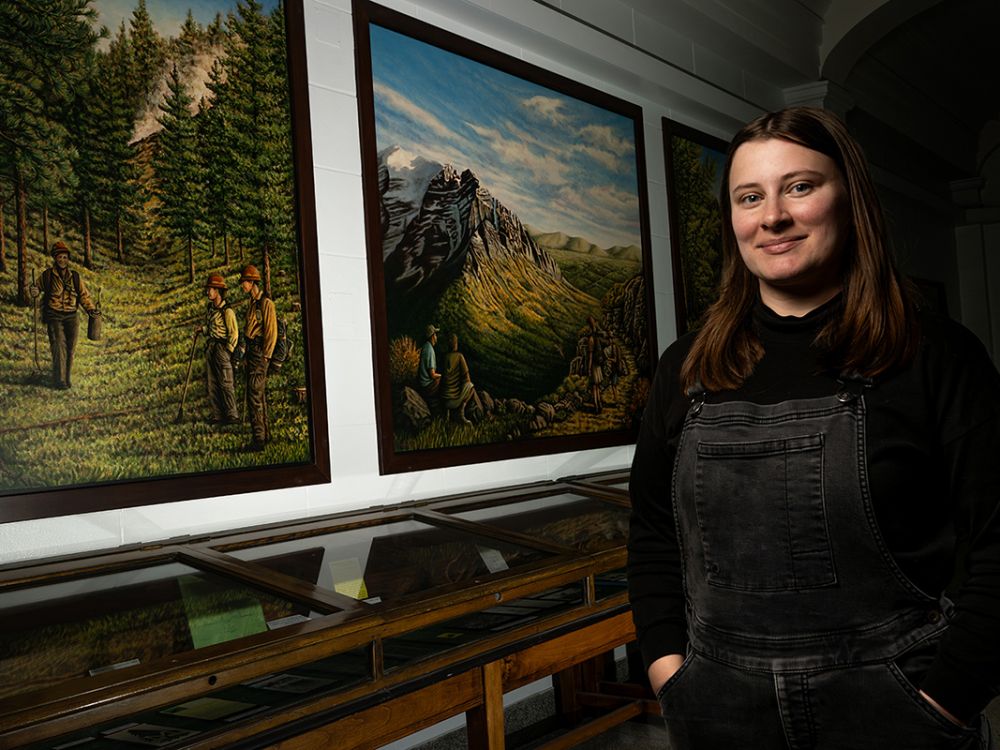By Libby Riddle, UM News Service
MISSOULA – 91次元 graduate student Cloe Sliva recently earned the prestigious designation of Wyss Scholar.
The Wyss Scholars Program supports graduate students who demonstrate a dedication to land conservation in the U.S. through work with land management agencies or nonprofits. Funded by the , the scholarship award will support her master’s research on watershed restoration planning.
Sliva grew up in Flagstaff, Arizona, where she was raised by parents who also work in environmental fields. She credits this upbringing for her passion for watershed conservation.
“Arizona has beautiful creeks and rivers, but in Flagstaff, there’s no perennial river that runs through town,” Sliva said. “You have to leave if you want to find a creek to fish or swim in. There’s a general awareness of the scarcity of water resources.”
Before coming to UM, Sliva had approached conservation from a physical science perspective, using her background in chemistry and geology. When applying to master’s programs, she was drawn to the opportunity to explore the people and community-focused aspects of conservation at the W.A. Franke College of Forestry and Conservation at UM.
“The caliber of conservation work being done in the College of Forestry was really exciting to me,” Sliva said.
In the resource conservation master’s program at UM, Sliva works to analyze watershed restoration planning, a subset of the larger field of environmental planning, across western Montana. The Wyss funding will allow her to investigate the history of watershed restoration planning and its successes as a conservation tool.
“Watershed restoration planning can help ensure that waters can be restored to beneficial uses for working lands, for recreators, for wildlife, for everybody,” Sliva said.
She credits UM faculty members Sarah Halvorson and Martin Nie for encouraging her to apply for the Wyss Scholars Program. Through Nie’s public policy and lands course, she connected with the policy aspects of public lands and began to understand their vulnerabilities. With Halvorson, a professor of geography, she explores the human side of watersheds.
“A ‘humanized watershed’ is the idea that we are a big driver of changes in these watersheds and that this impact is a facet of conservation that needs to be accounted for,” Sliva said.
She is passionate about keeping her work local in order to have the greatest positive impact on the environment surrounding her new home in Missoula, which she said would not have been possible without the funding from the Wyss Foundation.
With the support of the program, Sliva is developing a partnership with the Clark Fork Coalition, a Missoula nonprofit, to analyze restoration efforts on the Clark Fork River. She eventually plans to expand her analysis to the rest of western Montana so she can evaluate the effectiveness of different watershed restoration plans.
“Collaborating with different people is really important for addressing environmental problems, now more than ever, in ways that are equitable and durable,” Sliva said.
She sees this scholarship as a critical step toward launching her career in environmental planning. In addition to the financial support, she is excited to gain a network of like-minded professionals who share her goals for land and water conservation. She hopes to continue working on watershed restoration in Montana, applying the insights she uncovers in her master’s work to future challenges.
“Watersheds are one of the most integral parts of Montana in my opinion,” Sliva said. “Our waters define the state and the people who live in it. These watersheds fuel my Montana identity.”
###
Contact: Elizabeth Harrison, director of communications, W.A. Franke College of Forestry & Conservation, 917-656-9773, elizabeth.harrison@mso.umt.edu.
